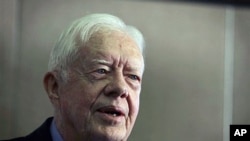As presidential contenders campaign for the Republican Party nomination, advertising that supports or attacks each of the candidates is already costing millions of dollars. In an interview former President Jimmy Carter, a Democrat who defeated Republican President Gerald Ford in the 1976 election, but who lost to Republican Ronald Reagan in 1980, says negative advertising is polarizing American politics.
Republican presidential hopeful Newt Gingrich promoted his plan to run a campaign free of negative attack ads in the run-up to the January 3 Iowa caucuses. “Our ads have been positive; the speeches have been positive. You have a chance tonight to send a signal to America that the consultant driven, viciously negative campaigns are totally wrong for this year when America is in these kinds of problems,” Gingrish said.
But negative advertising sponsored by a political action committee that supported Gingrich’s rival, Mitt Romney, helped influence voters in Iowa. “Newt has a ton of baggage. He was fined $300,000 for [House of Representatives] ethics violations and took $1.6 million from [mortgage] Freddie Mac before it helped cause the economic meltdown," said one ad.
Gingrich placed fourth in the Iowa caucuses.
His campaign changed for the South Carolina primary election, and began negative attacks on his main rival, Romney.
“Massachusetts moderate Mitt Romney. He can’t be trusted.
I’m Newt Gingrich, and I approve this message.”
Millions of dollars are flooding into Florida ahead of that state's Republican primary for similar ads, as the Republican presidential hopefuls and the political action committees, or PACs, that support them, fight for the lead in the party's nomination.
Former President Jimmy Carter says it is a very different atmosphere from the campaigns of 1976 and 1980.
“When I ran against Gerald Ford, who was an incumbent president, and later when Ronald Reagan ran against me, as the Governor of California, we never had any dream of having negative advertisements. We would just refer to each other as "my distinguished opponent," and that's all,” Mr. Carter said.
Mr. Carter says much of the money he spent on his campaign for the presidency in 1976 came from a general fund of taxpayer contributions of one dollar each, based on a voluntary election on annual income tax forms.
“This massive injection of millions and millions -- hundreds of millions of dollars -- and the spending of a lot of that money on a negative campaign to destroy the reputation and character of our opponents is what has divided our country. That division takes place not only in the congressional district or in a state, but it carries over into Washington. It also permeates, I think, the general society, where you have very rigid, now, blue states and red states, [i.e., Democrat and Republican leaning states] which we didn't really know when I was in politics,” Mr. Carter said.
Although Republican President Gerald Ford was defeated by Democrat Jimmy Carter in 1976, the two men overcame their differences.
In his Inaugural address in January 1977, President Carter thanked Gerald Ford for helping heal the nation in the wake of the Watergate scandal.
Mr. Carter says from that moment, the two men formed a bond that was the closest of any two presidents in U.S. history.
“When I was with Jerry Ford and we were riding somewhere together in the same car, we always hated to get where we were going because we just liked to be with each other. I think that's a kind of a personal relationship that used to exist, even among senators who are Democrats and Republicans, and members of the House [of Representatives] 25 years ago. It no longer exists. And there's an incompatibility and an animosity,” Mr. Carter said.
Mr. Carter says he and former President Ford attended library dedications side by side and took part in post-presidential events together. They also participated in an reform commission that addressed the irregularities of the 2000 general election.
Then, in 2006, an ailing Gerald Ford made one last telephone call to his friend . . .“ and asked me if I would give the eulogy at his funeral. I was kind of taken aback, so I said, 'Jerry, I'll do it on one condition -- that you give the eulogy at my funeral,' and so we made an agreement,” Mr. Carter said.
Former President Carter lived up to his end of that agreement on January 3, 2007, when he delivered the eulogy at former President Gerald Ford’s funeral service in Grand Rapids, Michigan, Mr. Ford’s hometown.
Jimmy Carter: Negative Political Ads are Dividing the Nation











